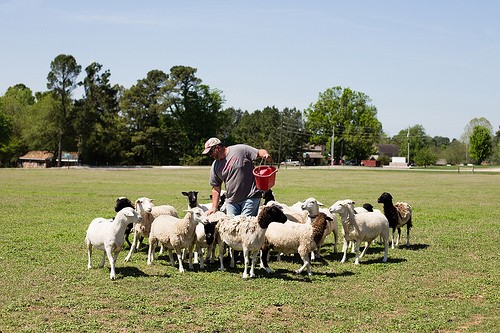Hardy sheep breed helps animal science researchers study forage and byproducts.
July 2, 2018

Animal science researchers at the University of Arkansas System Division of Agriculture have acquired a flock of Dorper sheep to help examine forage and ruminant digestion. Animal science professor Ken Coffey said, in the past, the Division of Agriculture’s animal science department bought lambs as they began different studies, but this method consistently presented many issues.
“Prior to establishing the Dorper flock, we were having to buy lambs when we had studies planned,” Coffey said. “This often resulted in a number of problems and sometimes a problem with uniformity. We knew nothing about their genetics, health status or age.”
After working with an inconsistent flock of hair sheep, Darren Bignar, program technician for the division’s animal science department, began researching different breeds and decided to look into Dorper sheep. After completing the research, Bignar decided that the hardy breed was a good fit.
Dorper sheep originated in South Africa from crossing Dorset Horn with Black-headed Persian sheep. There are black-headed and all-white varieties; the herd at the Fayetteville, Ark., farm consists of both.
The department is currently working with 39 ewe lambs but plans to keep a smaller flock.
“Going down to 30-35 lambs will allow us to cull off the low end, lower-quality, poorer-performing ewes to enhance uniformity,” Coffey said.
Bignar said working with Dorper sheep, as opposed to other ruminant animals, offers a variety of advantages.
“We like that they’re very heat, cold and parasite resistant,” Bignar said. “We needed a good, small sheep that wouldn’t shed. Also, the babies are born the same size at the same time, giving us a uniform animal to work with.”
Coffey noted that the Dorper sheep will be used for digestion studies.
“We are looking at the different forage composition and how it affects the urine and feces,” Coffey said. “Then, we apply the urine and feces to the soil and look at gas emissions. We’re trying to see how can manage the diet to reduce environmental impact.”
Bignar added that because Dorper sheep have simplified current projects so much, he thinks this breed has opened doors for future projects that may not have worked with larger animals.
Dirk Phillip, associate professor for animal science for the University of Arkansas System Division of Agriculture, said these characteristics, among others, make Dorper sheep ideal for their operation.
“I am very excited that we have the opportunity to work with these sheep. They are very different than cattle because of their size and their eating habits,” Philipp said. “These sheep eat things that cattle won’t; therefore, they make good use of the forage we have.”
Although the sheep are being used as a model for ruminant research, they bring the potential for more, the university said.
“I’d also like to do grazing research and co-graze the Dorper sheep with cattle. The Dorper sheep will eat things the cattle won’t, so if you have 100 different forage species, the cattle may only eat 15,” Philipp said. “However, because Dorper sheep have a diverse appetite, if you co-graze them, the forage species composition may shift.”
You May Also Like


.png?width=300&auto=webp&quality=80&disable=upscale)
